By Roy S. Askins and Sarah Reinsel
“To be a confessional Lutheran is sometimes the lonely way,” said the Rev. Dr. Jonathan Shaw, director of LCMS Church Relations. “When viewed from the perspective of individual international sister churches, it can be a lonely life. But coming together in the fellowship of Christ and His Word, we experience hope and joy in Jesus.”
The Lutheran Church—Missouri Synod has altar and pulpit fellowship with 43 sister churches around the world. These sister churches face the same significant pressures as the LCMS as they seek to preach Christ crucified in a secular age.
“[We face] a lot of challenges … to the authority of Scripture,” said the Rev. Joseph Ochola Omolo, bishop of the Evangelical Lutheran Church in Kenya (ELCK).
To help LCMS partner churches remain steadfast in the Word of God, the International Church Relations Conference (ICRC) meets annually in order to cultivate community and fellowship among these church bodies. The ICRC exists to enhance unity in Christ and His Word in worldwide confessional Lutheranism through theological presentations, thoughtful discussion, invigorated friendship and mutual support.
This conference “is an opportunity for confessional Lutheran church leaders of LCMS sister church bodies around the world to come together and grow together in Christ,” said Shaw.
Leadership Under the Cross
The most recent conference, themed “Leadership Under the Cross,” took place in October 2023 in Wittenberg. Sixty-eight guests representing 34 countries attended the conference. Participants gathered for lectures and discussions on the intersection of leadership and the theology of the cross.
In a series of 30-minute presentations followed by extensive, facilitated discussion, eight presenters took up these four topics: “Founded on the Atonement,” “Focused on Word and Sacrament,” “Steadfast in a World of Change” and “Leading with Administrative Excellence.”
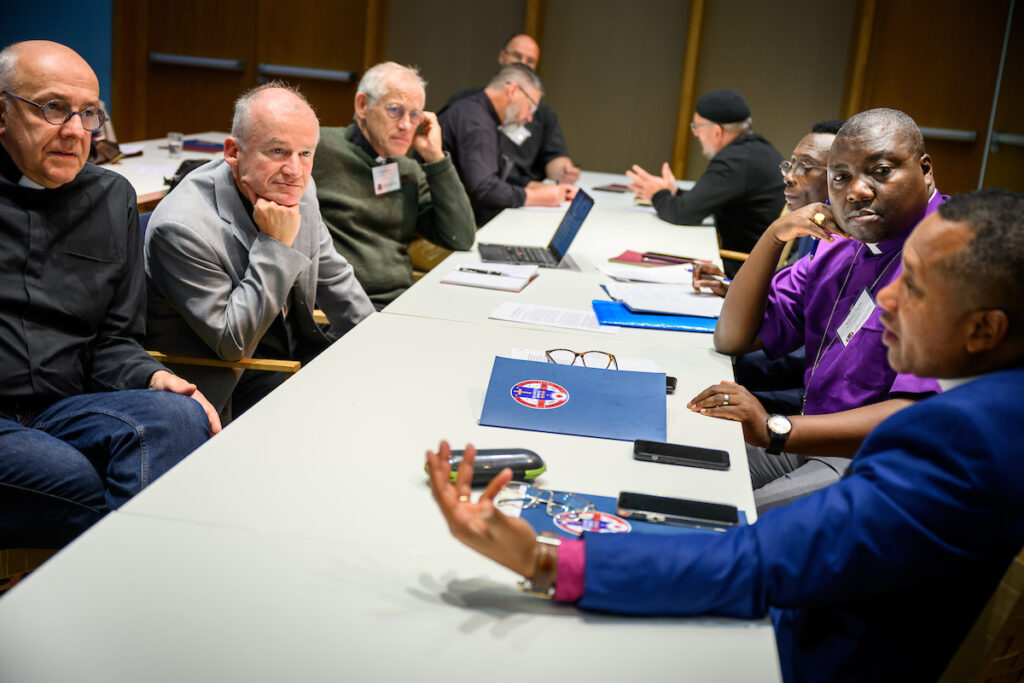
Preaching Christ crucified was at the heart of each presentation.
“It seems like everyone wants to be a leader these days,” said the Rev. Mindaugas Sabutis, president of the Evangelical Lutheran Church of Lithuania. “In our circumstances, not only in the church, but everywhere, we hear how to be a leader.”
But Sabutis does not look to contemporary culture or society for answers about how to be a leader. Rather, he looks to Christ and the cross: “When those two — cross and leadership — come together, I think this is an answer [for how to be a leader] because our leadership is not ours. … It comes from the cross, from Christ’s suffering.”
Considering leadership under the cross generated helpful discussion about pressing topics like the atonement and women’s ordination.
“All of the topics generated helpful discussion. The pastoral office, confessional subscription, the service of women and strategic planning all focus on the cross. Societal and [Lutheran World Federation (LWF)] pressures push against this focus,” said the Rev. Michael Frese, deputy director of LCMS Church Relations.
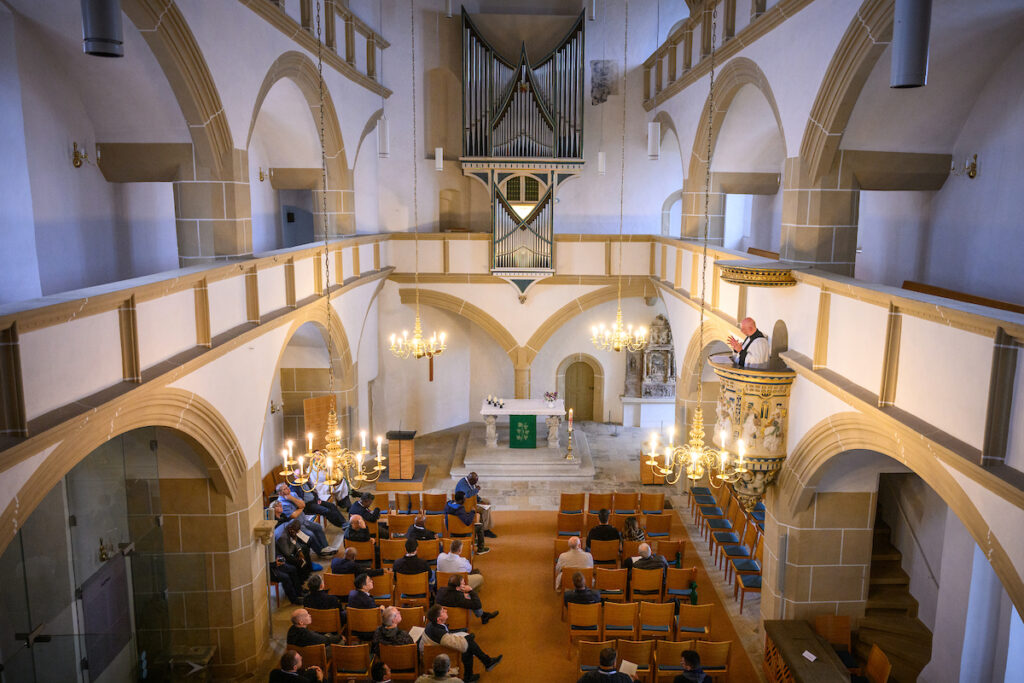
These discussions and presentations are not merely academic. Rather, the church leaders in attendance had an earnest and heartfelt desire to take what they have learned back home and train up the next generation of pastors and church leaders.
“My personal hope is to be enriched by rich confessional theology so that I can take it back to my country and share it with my pastors and congregation members,” said the Rev. Dr. J. Priestly Balasingh, president of the India Evangelical Lutheran Church.
Omolo of the ELCK seeks to help the young and growing Kenyan church have “respect for the Lutheran Confessions” and “adhere to the authority of Scripture and the teaching of Christ.” Partnership with the LCMS and conferences like this one provide essential support.
“Our church is growing, young as it is,” said Omolo. “We need a brother with whom we walk together as confessional Lutheran church bodies.”
And, in times of persecution, it is especially helpful for fellow church leaders to reflect upon “leadership under the cross.”
“For me, personally, it’s very important to meet other church leaders here,” said the Rev. Dr. Juhana Pohjola, bishop of the Evangelical Lutheran Mission Diocese of Finland. Pohjola has faced intense persecution from government prosecutors in Finland for his faithful expression of the Bible’s teaching on human sexuality.
“We all face struggles inside the church, in our life, family lives, in the society. And the only thing that we know that can give comfort, strength and joy is to fix our eyes on Christ crucified.”
Steadfast in His Word
The annual ICRC is part of the long-term work, undertaken by confessional Lutherans around the world, to build unity in Christ throughout global Lutheranism. This work has begun to bear fruit: some international church bodies have begun to move away from the LWF.
Frese noted this change: “A number of our sister and associated churches are seeing the errors of the LWF’s teaching and are maintaining the truth against these errors.”
These churches see the LCMS’ firm stance on Scripture and the Lutheran Confessions and are encouraged by it.
“They see our public confession,” said Frese, “and how we stand upon God’s Word as the sole authority and the confessional subscription that we have to the Book of Concord … and that our focus is upon preaching the Word and administering the Sacraments. … And they’re reaching out for support because they want to fight the culture.”
Last year, the Evangelical Lutheran Church of Ghana (ELCG) passed a resolution severing its relationship to the LWF and its affiliates, due to LWF’s promotion of LGBTQ+ practices among its affiliate churches.
The Rev. John Shadrak Donkoh, bishop of the ELCG, recently shared the story of the church’s decision and explained their rationale: “The ELCG wants to be committed to the inspired and infallible Holy Scriptures … and to the Lutheran Confessions contained in the Book of Concord as a true exposition of Holy Scripture.”
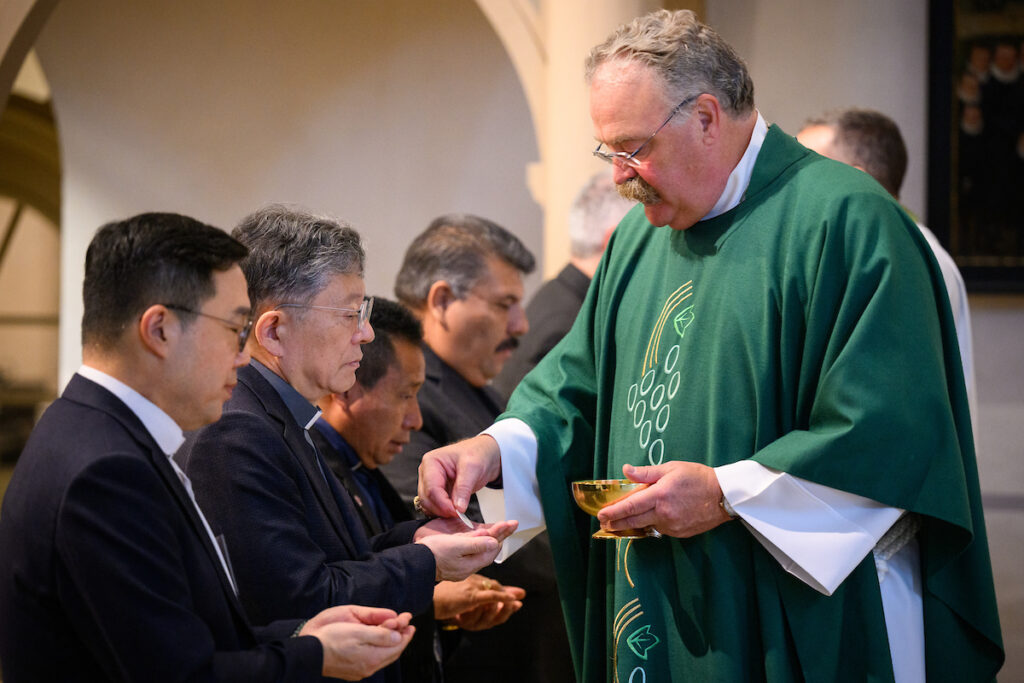
Cultivating the relationships among international church bodies takes ongoing work, and planning for next year’s conference has already begun. The theme will be “Christ — the Lord of History.”
“To see how He is the Lord of history as it says in the Formula of Concord,” Shaw noted, “shows that all of the afflictions that we as Christians and the church undergo … more fully conform us to the image of God in Christ.”
A Church in Rome
Other signs of hope in Christ’s church around the globe are also appearing. On Jan. 27, 2024, Christus Victor Lutheran Church held its inaugural service in the heart of Rome.
This new church plant, not two miles from the Vatican, is the culmination of work that began five years ago, when Luiz Lange, who is now a seminarian at Riga Luther Academy, reached out to the LCMS asking for information about mission work in Rome.
From there, mission work in Italy has blossomed. In 2021, the LCMS called the Rev. Tyler McMiller to serve as a full-time missionary in Italy, based in Rome. But due to visa issues, McMiller was only able to relocate full time to Rome with his family in September 2023. While his family remained in the U.S. awaiting visas, McMiller began the work in Italy.
Through various social media posts and online videos, numerous other Italian families have connected with LCMS mission work in Italy. The people reaching out to McMiller for more information on Lutheranism tend to have similar backstories.
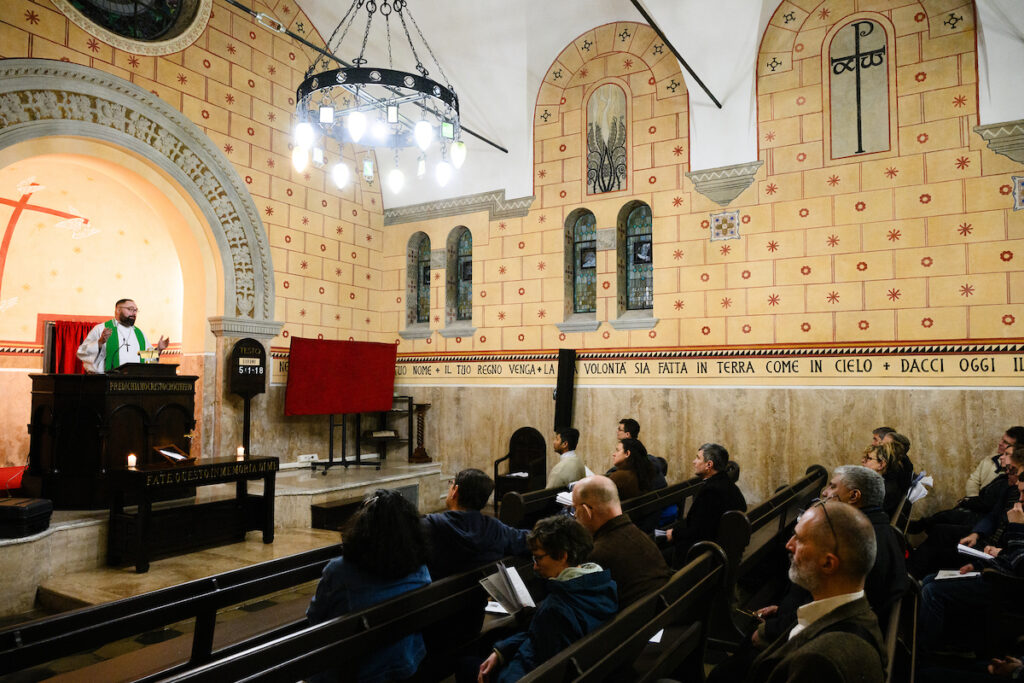
“They grew up Roman Catholic, then they got tired of corruption or the scandals or the inconsistency with Scripture,” McMiller said. “Then they get into the Baptist, Pentecostal world of Italy, which is very strong.”
But for many of these people, they begin to notice things missing in the Pentecostal churches, namely the sacraments and liturgical worship. “And then they start exploring more, and they find out about the Lutheran faith. … And they contact me.”
These contacts have led to work across the peninsula, in Naples, Florence, Padua, Turin and Rome. As soon as McMiller was able to relocate to Rome, the small congregation started meeting in his home while they looked for more permanent accommodations.
This mission work in Rome is supported by a number of laymen, including two young men studying with Lange at Riga Luther Academy to become pastors: Joshua Salas and Lorenzo Murrone. In addition to their studies, these young men have assisted a great deal with translation work. Already, a dedicated group has translated 250 hymns, a setting of the Divine Service, Matins and Vespers into Italian.
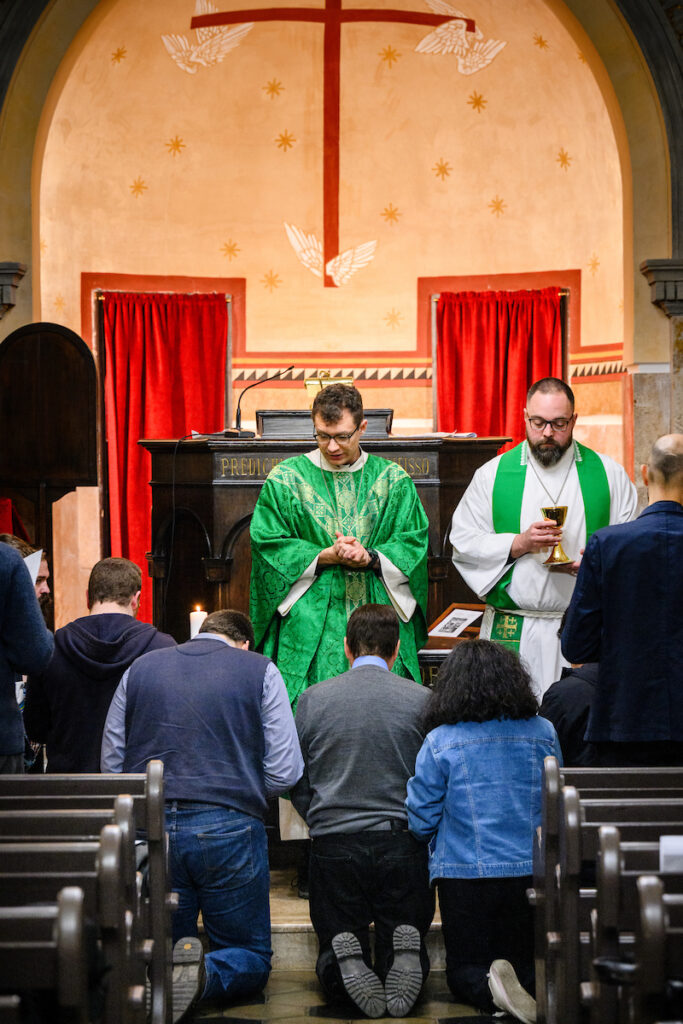
With the inaugural service of Christus Victor, even more people in Italy will be able to hear the Gospel preached. Many of those who have reached out to McMiller and the other Lutherans in Italy have done so because they heard the glorious proclamation that Christ died for their sins that they might have new life in Him — a message they had not heard in other churches in Rome.
Now and Not Yet
Christians live in the “now and not yet” of God’s promises. He has indeed promised us great blessings, but we do not always see the evidence of those blessings. It is tempting to look at small congregations or declining numbers and fall into the trap of thinking that God’s work is not continuing.
But God has promised that His Word will go forth and will not return empty. That does not mean packed pews and overflowing offering plates. It does mean that wherever the Word goes forth, God creates faith. He will preserve His church, perhaps as a remnant underneath persecution.
All the while, we place our hope in God, who is our help and our refuge, and we build up our brothers and sisters in the faith around the world, encouraging every church to at all times preach Christ crucified.

This article originally appeared in the March 2024 issue of The Lutheran Witness.


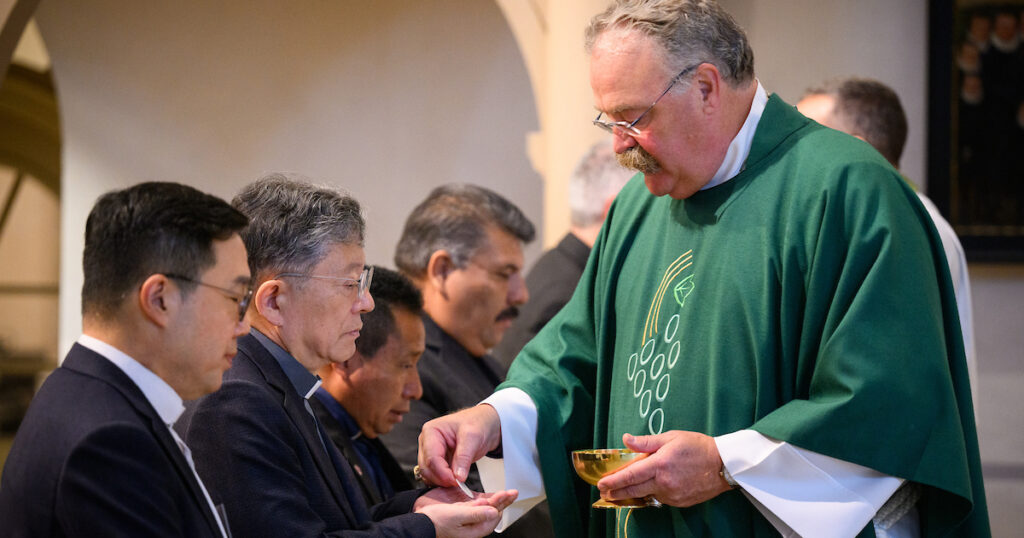



My husband and I have been members of the LCMS for a while and see the wonders of God’s gift of faith taught through Scripture.
We enjoy fellowship in Christ’s body and His cup of the new Covenant for the forgiveness of our sins.
But sadly, many people (weak & wounded) have been “driven out” as evil and denied Fellowship through Christ’s body and blood for the very forgiveness they needed.
Yes, we need discipline through Scripture (2 Timothy 3:16), whenever we proudly dishonor God’s Spirit. (1 Corinthians 6:18-20, 7:2, Titus 1:16, Jude 1:4-7)
But, to deny or drive out Christians (God’s Church) for not following Man/Luther’s interpretations seems highly unbiblical.
1 Kings 18:21, Proverbs 30:6, (of Course, Jesus is the Word in the flesh…) John 17:17-21, Acts 2:42, 1 Corinthians 4:5-6
First John 4:6
I hear these weak and wounded Christians who love Christ and His Word: crying out against man made doctrines.
“But he turned and said to Peter, “Get behind me, Satan! You are a hindrance to me. For you are not setting your mind on the things of God, but on the things of man.””
Matthew 16:23 ESV
“But he answered, “It is written, “‘Man shall not live by bread alone, but by every word that comes from the mouth of God.’””
Matthew 4:4 ESV
Acts 17:11
As someone who has been in positions of leadership within my own congregation, I have actually benefitted from learning about concepts of leadership that have been developed and demonstrated outside the church. In my experience, practical insights coming out of organizational science and the business world can be useful.
As a Christian, I find it particularly interesting that a variety of secular sources have highlighted “servant leadership,” for which we can find ample support in Scripture, chiefly by the example of Jesus himself (John 13:1-17, Phil. 2:5-7).
Good leadership has good aims: “The aim of our charge is love that issues from a pure heart and a good conscience and a sincere faith” (1 Tim. 1:5 ESV).
And so, “Having gifts that differ according to the grace given to us, let us use them: … the one who leads, with zeal” (Ro. 12:6-8).
Are ELCA Lutherans able to receive communion at your congregation in Rome Italy?
In the LCMS, we commune those who share our confession of faith. I’m certain our missionary there would be delighted to catechize toward membership. But we do not commune members of the ELCA.